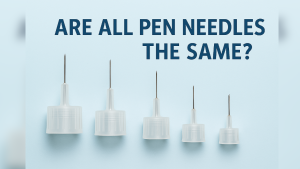Be sure to talk to your healthcare professional before making any treatment changes.
The holiday season is a time for joy, togetherness, and the enjoyment of delicious food. But for individuals with diabetes, it can also be a challenging time to navigate dietary needs and expectations. Communicating your dietary requirements to family and friends during holiday celebrations can feel uncomfortable, but it’s a crucial step in ensuring your health and happiness. As an expert in diabetes management, I’m here to offer some practical advice on how to approach these conversations with grace and confidence.
1. Prioritize Your Health:
Start by reminding yourself that your health is paramount. Recognize the importance of managing your diabetes, as it directly impacts your overall well-being. This mindset can empower you to communicate your dietary needs with conviction.
2. Choose the Right Time and Place:
Pick an appropriate moment to discuss your dietary needs. Opt for a quiet, private setting where you can have a meaningful conversation without distractions or interruptions.
3. Be Honest and Open:
When addressing your dietary requirements, be honest and open about your condition. Explain that managing diabetes involves making specific food choices to maintain stable blood sugar levels.
4. Educate, Don’t Accuse:
Help your loved ones understand your needs by educating them about diabetes and its dietary aspects. This is an opportunity to dispel misconceptions and foster empathy.
5. Share Your Meal Plan:
Provide a brief overview of your typical meal plan. Explain that you focus on balanced, nutritious options and that it’s not about deprivation but rather making smart choices.
6. Offer to Contribute:
To alleviate the burden on your host or family, offer to bring a diabetes-friendly dish to share at the holiday gathering. This way, you can enjoy a meal that fits your needs while ensuring others can also enjoy it.
7. Use “I” Statements:
Frame your requests using “I” statements to express your feelings and needs without sounding accusatory. For example, say, “I need to be mindful of my carb intake” instead of “You shouldn’t serve so many carbs.”
8. Request Support:
Ask for the support and understanding of your loved ones. Explain how their backing can make it easier for you to manage your diabetes during the holidays.
9. Be Ready for Questions:
Expect questions about your condition, your dietary needs, and your meal plan. Be prepared to answer them patiently and without judgment.
10. Offer Alternatives:
Suggest alternatives to traditional high-carb and sugary dishes. Share diabetic-friendly recipes or propose swaps that allow everyone to enjoy delicious, healthier options.
11. Foster Inclusivity:
Emphasize that you want to partake in the holiday festivities with everyone. Make it clear that your goal is to enjoy the company and the celebration, not to stand apart from the group.
12. Seek Allies:
Identify family members or friends who are supportive and can help you convey your needs to others. They can act as advocates and provide reinforcement.
13. Practice Empathy:
Remember that your loved ones may not fully comprehend the intricacies of diabetes. Approach the conversation with empathy, understanding that it might take time for them to adjust.
14. Offer Appreciation:
Express gratitude for your family and friends’ willingness to accommodate your needs. Let them know how much you value their support.
By implementing these strategies, you can have open and effective conversations about your dietary needs during holiday celebrations without feeling uncomfortable. In the end, the goal is to foster understanding and create an environment where you can enjoy the festivities while managing your diabetes with the support of your loved ones.
Remember that your healthcare provider or a registered dietitian can offer additional guidance and resources to help you navigate this holiday season successfully.
Sources:
1. American Diabetes Association. (2022). Making Healthy Food Choices. https://www.diabetes.org/nutrition/healthy-food-choices-made-easy
2. Joslin Diabetes Center. (2022). Diabetes and Social Events. https://www.joslin.org/patient-care/diabetes-education/diabetes-learning-center/diabetes-and-social-events









